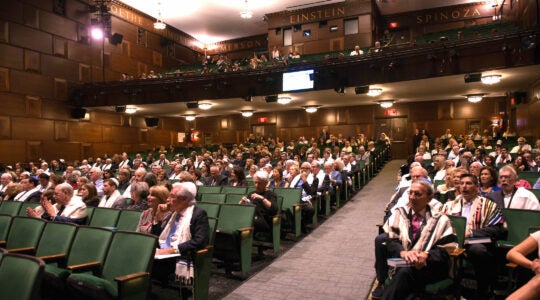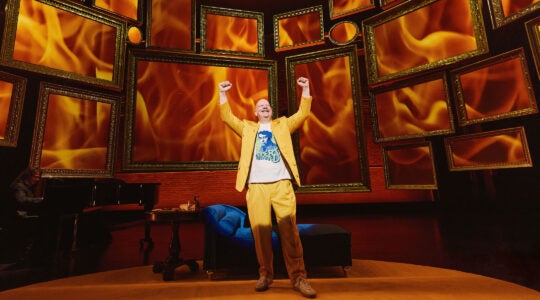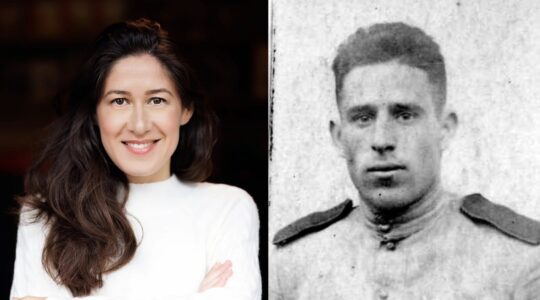‘It is true that You alone are the One who judges,” reads our High Holiday liturgy. As I prepare for the upcoming Days of Awe, I’m reminded of my own recent encounter with our justice system.
As an American, I often feel removed from our political process. I vote in elections, protest, sign petitions and organize when I feel so moved, but otherwise I don’t really feel connected to a civic community. Last month, for the first time, I was selected for jury duty.
In the courtroom on Centre Street, over 200 potential jurors entered as we heard the charges: attempted murder in the second degree, assault in the first degree, illegal possession of a firearm. After some creative attempts by people to show how they couldn’t be “fair and impartial” (“Your honor, I lived down the street from O.J. Simpson. I think he was guilty and have since lost faith in the criminal justice system”), 16 of us were eventually chosen; 12 jurors and four alternates.
Opening statements followed. The defendant, a young man in his 20s, was walking with his girlfriend in the Bronx when an altercation took place between him and two men he brushed up against in passing. According to the prosecution, the defendant was carrying a gun, showed it to the two men, who exchanged words with him. According to the defense, he showed his new iPhone 6 saying he’d take pictures after they threatened him. His girlfriend begged him to leave, informing him these men were “Trinitarios,” members of a local gang. The defendant and his girlfriend did leave, only to be attacked a few moments later from behind by a man uninvolved in the initial altercation. The defendant was knocked to the ground, and the two men he had first brushed up against ran back towards him to beat him (according to the defense) or remove the pistol (according to the prosecution).
The rest is murky; the defendant runs away but still shoots at his attackers; his chasers continue to threaten him, at one point throwing a brick his way. No one dies though some do incur gunshot wounds. The defendant and his girlfriend hide from the police and/or the gang chasing him; he discards the weapon in a building’s garbage disposal.
The truth becomes harder to decipher; is the defendant lying, or the police officer who later testifies that the defendant said, “I should have listened to my brother and gotten rid of the gun?” With the defendant denying this took place and the officer never writing this down in his memo book, whom are we to believe?
And who are we to sit in judgment in the first place? The judge instructs us: “You are the judges of the facts; I the judge of law. Use your common sense.”
As in the famous courtroom drama “12 Angry Men,” we are a room of strangers bound by our jury summons but also by our humanity; our emotions rise, though we are forbidden to articulate them. We are a doctor, advertising exec, army veteran, social worker, physical trainer, Broadway director, struggling actor, computer specialist, TV writer, postal office worker, rabbi. We are white, black, Hispanic, Asian. Muslim, Christian, Jewish. New Yorkers.
After a two-week trial, deliberations begin; the 12 of us are set to work. “Do not let empathy or concern for sentencing impact your decision,” the judge states. “Base your verdict on the evidence alone.”
I am full of awe. The sages of the Talmud teach that in order to emphasize the gravity of capital cases, the court presses the witnesses and informs them: “Anyone who destroys a life is considered by Scripture to have destroyed an entire world and anyone who saves a life is considered to have saved an entire world.” This rings true now with the defendant’s world at stake.
One witness’ testimony stands out. An expert in DNA analysis tells us that the makeup of any given person’s DNA is 99 percent similar; it’s only less than 1 percent that accounts for our own uniqueness, our specific individuality. That means our genetic makeup is more or less the same as every other person on the planet. The wars we wage, the religions we ascribe to, the political parties we feel part of, the privilege we are or are not born with all come down to a tiny 1 percent.
We deliberated as a jury for about two days until we reached a unanimous verdict on all eight counts. A few days later, we gathered as a jury for Shabbat dinner at my home. As for the case, we hope and pray our verdict was fair and just. During this vitriolic political season, I am grateful for the opportunity to pause and remember that our vast similarities do indeed trump our particular differences.
Avram Mlotek is co-founder of BASE Hillel.
The New York Jewish Week brings you the stories behind the headlines, keeping you connected to Jewish life in New York. Help sustain the reporting you trust by donating today.




